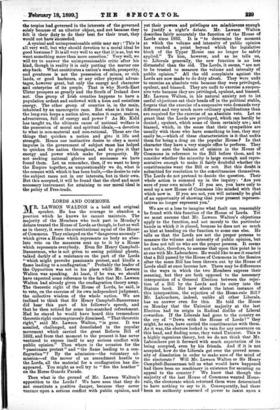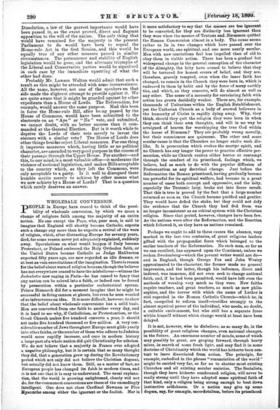LORDS AND COMMONS.
MR. LAWSON WALTON is a bold and original speaker. He has the courage to abandon a position which he knows he cannot maintain. The majority of the Members who took part in Monday's debate treated the House of Lords as though, in fact as well as in theory, it were the constitutional equal of the House of Commons. They enlarged on the " dangerous anomaly " which gives a House which represents no body an abso- lute veto on the measures sent up to it by a House which represents everybody. Even Sir Henry Cam pbell- Bannerman, who is not given to seeing political ghosts, talked darkly of a resistance on the part of the Lords " which might provoke passionate protest, and kindle a flame leading to a conflagration." Probably the leader of the Opposition was not in his place while Mr. Lawson Walton was speaking. At least, if he was, we should have expected some reference to the fact that Mr. Lawson Walton had already given the conflagration theory away. The theoretic right of the House of Lords, be said, is to veto, on the exercise of its own independent judgment, the collective wisdom of the whole nation. We are inclined to think that Sir Henry Campbell-Bannerman did hear this part of his follower's speech, and that he then retired for some late-snatched refreshment. Had he stayed he would have heard this tremendous theoretic right contemptuously dismissed. " That theoretic right," said Mr. Lawson Walton, " is gone. It was assailed, challenged, and demolished in the popular movement which carried the great Reform Bill of 1832, and from that moment to the present it has never ventured to expose itself to any serious conflict with public opinion." Then where is the occasion for the " passionate protest " and " the flame leading to a con- flagration"? By the admission—the voluntary ad- mission—of the mover of an amendment hostile to the Lords, all the material for a conflagration has dis- appeared. You might as well try to " fire the heather" on the Horse Guards Parade.
Then what is the ground of Mr. Lawson Walton's opposition to the Lords ? We have seen that they do not constitute a positive danger, because they never venture upon a serious conflict with public opinion, and yet their powers and privileges are mischievous enough to justify a night's debate. Mr. Lawson Walton describes fairly accurately the function of the House of Lords since 1832. It is " to determine the moment at which the volume and intensity of public opinion has reached a point beyond which the legislative block of the -Upper House can no longer be safely applied." To him, however, and as he tells us, to Liberals generally, the new function is no less distasteful than the old. The Lords, it seems, " are not to be trusted to measure the volume and intensity of public opinion." All the old complaints against the Lords are now made to do duty afresh. They were unfit to exercise an absolute veto because they were privileged, opulent, and biassed. They are unfit to exercise a suspen- sive veto because they are privileged, opulent, and biassed. Mr. Lawson Walton, in his natural anxiety not to let useful objections eat their heads off in the political stable, forgets that the exercise of a suspensive veto demands very different and very much more ordinary qualifications than are required for the exercise of an absolute veto. Let us grant that the Lords are privileged, which can hardly be denied ; opulent, which some of them certainly are ; and biassed, which, in the sense that their sympathies are usually with those who have something to lose, they may easily be,—which of these characteristics is it that unfits them for being a, drag on the popular House ? In that character they have a very simple office to perform. They have to note the balance of opinion in the House of Commons in reference to the Bill before them, and to consider whether the minority is large enough and repre- sentative enough to make it fairly doubtful whether the constituencies want the Bill or not. But this doubt is submitted for resolution to the constituencies themselves. The Lords do not pretend to decide the question. Their whole action is summed up in the inquiry : 'Are you sure of your own minds ? If you are, you have only to send up a new House of Commons like minded with that which now is. If you are not, you will naturally be glad of an opportunity of showing that your present represen- tatives no longer represent you.'
We are at a loss to imagine what fault can reasonably be found with this function of the House of Lords. Yet we must assume that Mr. Lawson Walton's objections apply to the function, and not merely to the particular hands in which it is placed, because he does not so much as hint at handing on the function to some one else. He tells us that the Lords are not the proper persons to measure the volume and intensity of public opinion, but he does not tell us who are the proper persons. It seems not unfair, therefore, to assume that upon this point he is at one with Mr. Labouchere. He would like to see it enacted that a Bill passed by the House of Commons in the Session after the same Bill has been thrown out by the House of Lords shall at once become law. There may be differences in the ways in which the two Members express their meaning, but they are both opposed to the necessary interposition of a General Election between the rejec- tion of a Bill by the Lords and its entry into the Statute book. But how about the latest instance of this interposition, the rejection of the Home-rule Bill ? Mr. Labouchere, indeed, unlike all other Liberals, has an answer even for this. He told the House on Monday that the Unionist majority at the last Election had its origin in Radical dislike of Liberal cowardice. If the Liberals had gone to the country on the cry of " Down with the House of Lords ! " they might, he says, have carried the constituencies with them. As it was, the electors looked in vain for any assurance on this head, and finding none, they voted Unionist. This is a highly ingenious theory, but we do not think that Mr. Labouchere put it forward with much expectation of its being accepted, even by his friends. And if it is not accepted, how do the Liberals get over the proved neces- sity of dissolution in order to make sure of the mind of the electorate ? Will Mr. Lawson Walton or Sir Henry Campbell-Bannerman tell us what would have happened had there been no machinery in existence for securing an appeal to the country ? We know that though the majority of the last House of Commons wanted Home- rule, the electorate which returned them were determined to have nothing to say to it. Consequently, had there been no authority possessed of power to insist upon a Dissolution, a law of the gravest importance would have been passed in, as the event proved, direct and flagrant opposition to the will of the nation. The only thing that would have remained for the majority in the present Parliament to do would have been to repeal the Home-rule Act in the first Session, and this would be equally true of any other measure passed in similar circumstances. The permanence and stability of English legislation would be gone, and the alternate triumphs of the Liberal and Conservative parties would be signalised in each case by the immediate upsetting of what the other had done.
Probably Mr. Lawson Walton would admit that such a result as this might be attended with some inconvenience. All the same, however, not one of the speakers on that side made the slightest attempt to provide against it. We are quite aware that it might be guarded against by other expedients than a House of Lords. The Referendum, for example, would answer the same purpose. Had this been in force the Home-rule Bill, after being passed by the House of Commons, would have been submitted to the electorate on an " Aye " or " No " vote, and submitted, we cannot doubt, with no better success than it com- manded at the General Election. But is it worth while to deprive the Lords of their veto merely to invest the electors with a similar veto ? The House of Lords does other things besides reject Liberal measures. For one thing it improves measures which, having little or no political character, are amended to very good purpose in the course of their passage through the Upper House. For another—and this, to our mind, is a most valuable office—it moderates the violence of sectional legislation, and makes Bills acceptable to the country which, as they left the Commons, were only acceptable to a party. Is it well to disregard these humble merits merely to achieve by other means what we now achieve by a House of Lords ? That is a question which surely deserves an answer.







































 Previous page
Previous page